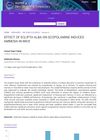6 citations,
September 2021 in “Autophagy” Autophagy prevents early aging and maintains lipid and pheromone balance in mouse glands.
 5 citations,
October 2018 in “Journal of Drug Delivery and Therapeutics”
5 citations,
October 2018 in “Journal of Drug Delivery and Therapeutics” Eclipta Alba may help reverse memory loss caused by scopolamine, suggesting it could treat Alzheimer's-related memory issues.
 3 citations,
May 2023 in “Biomedicines”
3 citations,
May 2023 in “Biomedicines” PCOS causes infertility mainly due to hormonal imbalances, insulin resistance, and chronic inflammation.
3 citations,
August 2022 in “International Journal of Molecular Sciences” COVID-19 can cause hair loss, and treatments like PRP and stem cells might help.
 2 citations,
September 2022 in “Cellular and molecular biology”
2 citations,
September 2022 in “Cellular and molecular biology” Agaricus bisporus derived β-Glucan could be an effective cervical cancer treatment with antimicrobial and antioxidant properties.
 1 citations,
May 2021 in “BMC Proceedings”
1 citations,
May 2021 in “BMC Proceedings” The document concludes that more research is needed to reduce frequent hospital visits, addiction medicine education improves with specific training, early breast cancer surgery findings are emerging, nipple smears are not very accurate, surgery for older melanoma patients doesn't extend life, a genetic condition in infants can often be treated with one drug, doctors are inconsistent with blood clot medication, a certain gene may protect against cell damage, muscle gene overexpression affects many other genes, and some mitochondrial genes are less active in mice with tumors.
 August 2024 in “Drug Design Development and Therapy”
August 2024 in “Drug Design Development and Therapy” Decursin shows promise for treating cancer, neuroprotection, inflammation, and hair loss.
 June 2024 in “Molecules/Molecules online/Molecules annual”
June 2024 in “Molecules/Molecules online/Molecules annual” Platycladus orientalis flavonoids protect balding hair from UV damage and slow hair color change.
May 2024 in “Molecules/Molecules online/Molecules annual” Plant extracts can help prevent hair loss and promote hair growth.
 May 2024 in “Chemical engineering journal”
May 2024 in “Chemical engineering journal” New treatment using Minoxidil and EGCG with ionic liquids improves hair growth and quality for hair loss.
 April 2024 in “Histochemistry and cell biology”
April 2024 in “Histochemistry and cell biology” N-acetylcysteine may prevent hair loss caused by chemotherapy.
 November 2023 in “Dermatologic therapy”
November 2023 in “Dermatologic therapy” The scalp serum reduced scalp discomfort and symptoms without affecting skin moisture loss.
 104 citations,
May 2019 in “F1000Research”
104 citations,
May 2019 in “F1000Research” Losing weight, fixing varicoceles, and using advanced sperm selection methods improve male infertility treatment outcomes.
 1 citations,
January 2023 in “Nutrients”
1 citations,
January 2023 in “Nutrients” Drinking lots of sugary drinks may increase the risk of hair loss in young men.
 December 2023 in “American journal of medical genetics. Part A”
December 2023 in “American journal of medical genetics. Part A” A new syndrome was linked to two new genetic changes in the MBTPS1 gene in a 14-year-old girl.
 January 2024 in “Journal of Tissue Engineering”
January 2024 in “Journal of Tissue Engineering” A new ethical skin model using stem cells offers a reliable alternative for dermatological research.
 July 2023 in “Journal of Biomedical Science”
July 2023 in “Journal of Biomedical Science” Different people show different symptoms for genetic diseases because of how sensitive their bodies are to small changes in important factors.
79 citations,
December 2017 in “Cosmetics” Effective sunscreen formulations can reduce skin absorption and enhance protection.
32 citations,
June 2021 in “Frontiers in Pharmacology” The hydrogel speeds up burn wound healing and promotes tissue regeneration.
 24 citations,
August 2020 in “AJGP”
24 citations,
August 2020 in “AJGP” A woman's sudden hair loss was linked to her previous COVID-19 infection.
4 citations,
December 2021 in “Journal of clinical laboratory analysis” A new mutation in the DCAF17 gene was found to cause Woodhouse-Sakati syndrome in a large family.
 2 citations,
September 2021
2 citations,
September 2021 Patients with alopecia areata may have lower vitamin D levels than healthy people.
2 citations,
September 2019 in “Neurology Neuroimmunology & Neuroinflammation” IVIg treatment improved symptoms but caused permanent dark hair loss.
 August 2024 in “EMJ Dermatology”
August 2024 in “EMJ Dermatology” Non-scarring alopecia in females affects emotional well-being and requires accurate diagnosis and personalized treatment.
Genetic analysis of rabbits identified key genes for traits like coat color, body size, and fertility.
 March 2024 in “Cell communication and signaling”
March 2024 in “Cell communication and signaling” Lack of sleep in mice leads to prostatitis by reducing certain hormones and activating an inflammatory pathway, which can be temporarily fixed with normal sleep.
July 2020 in “International journal of clinical & experimental dermatology” Hair loss in women aged 20-30 is often linked to deficiencies in Vitamin D, zinc, ferritin, and haemoglobin, as well as low SHBG levels in those with irregular periods.
75 citations,
July 2016 in “New phytologist” The protein RSL4 is crucial for making root hairs longer by controlling genes related to cell growth.
75 citations,
October 2012 in “Journal of Investigative Dermatology” Alopecia areata can be triggered by specific immune cells without genetic or environmental factors.
63 citations,
May 2015 in “PloS one” GALT5 and GALT2 are important for plant growth and development because they help with protein glycosylation.

















